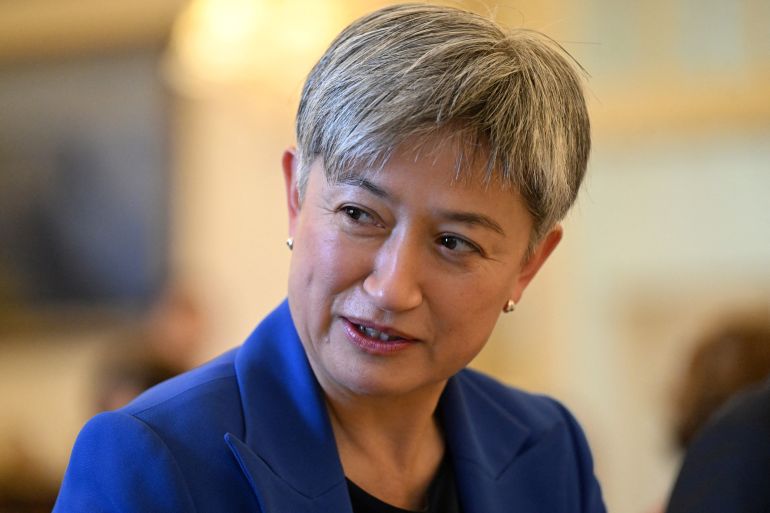Australian FM to visit Samoa, Tonga in bid to boost Pacific ties
Penny Wong to visit the countries days after her Chinese counterpart, as China and Australia vie for regional influence.

Australia’s recently sworn-in Foreign Minister Penny Wong is heading back to the Pacific Islands on Wednesday, travelling to Samoa and Tonga just days after her Chinese counterpart Wang Yi, amid a duel for influence in the region between Canberra and Beijing.
“We will increase our contribution to regional security: we understand that the security of the Pacific is the responsibility of the Pacific family, of which Australia is a part,” Wong said as she embarked on her second trip to the region after she visited Fiji last week.
Keep reading
list of 4 itemsBiden begins Asia tour aimed at boosting Indo-Pacific ties
China’s Pacific tour spurs hopes and fears in tiny island nations
Who is Anthony Albanese, Australia’s PM-elect?
“We will stand shoulder to shoulder with our Pacific family in addressing the existential threat of climate change. And we will deepen cultural and sporting ties,” she added.
Since being sworn in nine days ago, Wong has placed an emphasis on strengthening ties with Pacific nations. Australia’s new centre-left government is playing catch-up after years of relations with the Pacific Islands being hampered by the conservative government’s foot-dragging on climate change. Rising sea levels are seen as an existential threat by many of the low-lying Pacific island nations.
Her tour is taking place just after China’s Wang barnstorms through the region, looking to significantly deepen Beijing’s influence.
Although Wang failed to secure support for a regional security deal that would have seen Beijing play a bigger role in sensitive areas like policing and cybersecurity, he has been signing a series of agreements on each of his stops.
In Tonga on Tuesday, he pledged China’s support for sports stadiums and wind power projects, according to state media, while signing a series of deals on disaster prevention and mitigation, agriculture, fisheries and healthcare.
Tonga, which was hit by a volcanic eruption and tsunami in January, has an external debt of $195m, 35.9 percent of its gross domestic product (GDP), of which two-thirds is owed to China’s Export-Import Bank, its budget shows. Debt repayments to China spike in 2024, on a loan used to rebuild its central business district after riots in 2006.
While in Samoa last Saturday, the Chinese foreign minister signed a bilateral agreement that included a plan to build a police fingerprinting lab, in addition to an already announced police academy in the country.
United States President Joe Biden and New Zealand’s Prime Minister Jacinda Ardern have aired concerns about China’s bid to expand its influence in the Pacific. Biden said on Tuesday that Washington had no desire to dictate to the region but to partner with them. “We have more work to do in those Pacific Islands,” he said.
Despite their small populations and economies, each Pacific state represents a vote at international forums such as the United Nations. They also control vast swaths of resource-rich ocean and access to a region with strategic military significance.
On her first trip to Fiji last week, the Australian diplomat said Australia would set new, more ambitious emissions targets and bid to co-host a future UN climate conference with Pacific island countries. There would be no more “disrespecting” Pacific nations or “ignoring” their calls to act on climate change, she said.
“Fiji is not anyone’s back yard — we are a part of a Pacific family. And our greatest concern isn’t geopolitics — it’s climate change,” Fijian Prime Minister Franck Bainimarama on Twitter on Friday, adding he had a “wonderful” meeting with Wong.
Fiji is not anyone’s backyard — we are a part of a Pacific family. And our greatest concern isn’t geopolitics — it’s climate change.
In that spirit, I had a wonderful meeting with Foreign Minister @SenatorWong to strengthen our Vuvale Partnership with Australia. pic.twitter.com/RH80dPnCAk
— Frank Bainimarama (@FijiPM) May 27, 2022